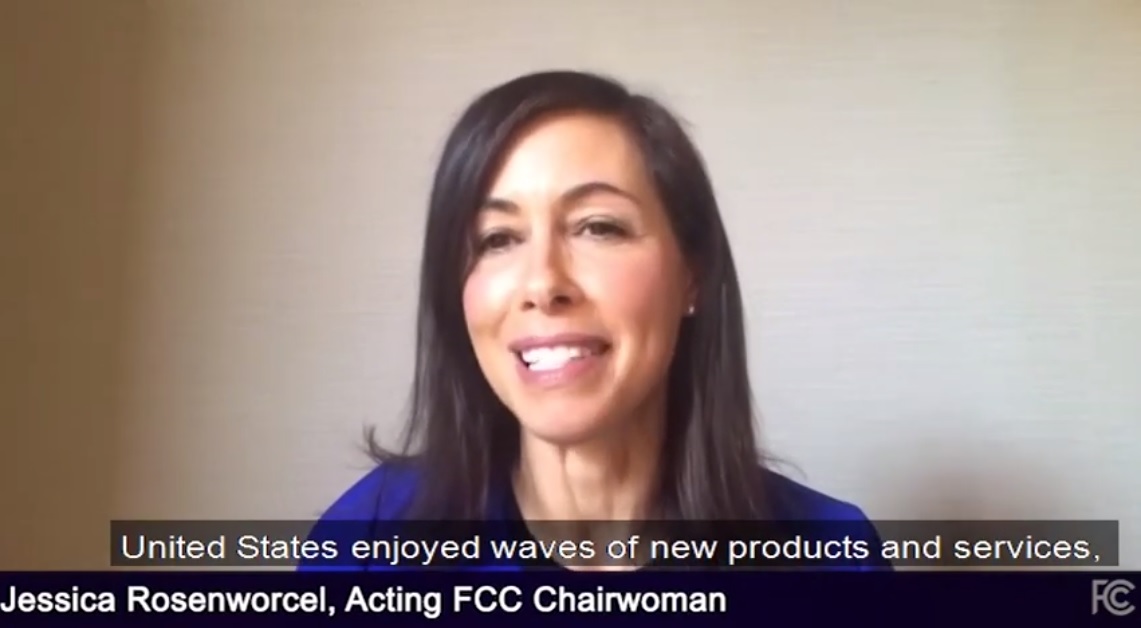Jessica Rosenworcel Salutes 1996 Telecom Act
Compiles videos from some key players, mostly Democrats

The smarter way to stay on top of the multichannel video marketplace. Sign up below.
You are now subscribed
Your newsletter sign-up was successful
Acting Democratic FCC chair Jessica Rosenworcel released a video Monday (Feb. 8) celebrating the 25th Anniversary of the 1996 Telecommunications Act featuring a virtual gathering some of the major players in that landmark legislation, with a heavy emphasis on the Democrats instrumental in its passage and implementation.
She said that there was no denying that tremendous progress had been made in the past 25 years, but that it was equally clear that access to communications from everyone, everywhere, has never been more important, and that there is still a lot of work to do.
That included Sen. Ed Markey (D-Mass.), who included a visual aid--a copy of the act and the digital pen that President Bill Clinton used to sign the act at the Library of Congress and later gave to Markey, one of the act's authors.
Markey called that signing a huge moment since it ushered in the broadband era, or what he called an "explosion of deployment" and launched the networks of today. Markey said it unleashed trillions of dollars of private sector investment and spurred "Darwinian competition," one of Markey's favorite phrases.
Also Read: Markey Announces Bill to Update E-Rate
But Markey said it was time to look forward as well as backward and "eliminate discriminatory data uses and algorithms that are harming vulnerable populations."
Also making an appearance from the Republican side was Rep. Fred Upton (R-Mich.), former chairman of the House Energy & Commerce Committee and the Telecommunications Subcommittee. He said the act had changed lives and added: "we're not done yet."
The smarter way to stay on top of the multichannel video marketplace. Sign up below.
Former Democratic FCC chairman Reed Hundt, who headed the FCC in 1996, said he had one of the analog pens from the Clinton bill-signing, given to him by the late Commerce Secretary Ron Brown. He said that after the signing, he returned to the FCC with his staff to answer the questions: "Now what do we do?"
He said the FCC had "intervened" in the drafting of the bill by insisting that "there be congressional deadlines put on the completion of the regulatory processes required under the act." There were more than four dozen, he said, on an agency that "doesn't normally live by deadlines."
Hundt said that with Markey's leadership, among others, one of the key elements of the act was the E-Rate subsidy for advanced telecom for schools and libraries. He said that while nobody was against it, "not many people knew why they were for it," so it took building support.
He pointed out that since then over $100 billion has gone into that fund.
Next on the video was House Energy & Commerce Committee chairman Frank Pallone (D-N.J.), who also praised the E-Rate and Lifeline subsidies.
Given the centrality of Rep. John Dingell (D-Mich.) in communications issues writ large over decades, it was appropriate that his widow and successor in that House seat, Rep. Debbie Dingell, also made an appearance.
Also Read:: Four Ways to Modernize the 1966 Telecommunications Act
She said that as a member of the committee she has worked to make sure laws continue to keep pace with the "staggering pace" of innovation. She said that as she looked to the future, there needed to be more bipartisan updates. "we need to enact universal broadband," she said, "so no one can be denied the power and potential of new technology." She said she was thinking of her late husband, who loved the act and the industry "more than most."
Former Republican commissioner Rachelle Chong, who was on the commission when the act was adopted, even provided a Telecom Act-related ditty, accompanying herself on the Ukelele.
Also making appearances were Larry Irving, former head of the National Telecommunications & Information Administration, who helped negotiate the act, and Democrats Susan Ness, a FCC commissioner when the act was adopted, and Gloria Tristani, who was a commissioner from 1997 to 2001.
Contributing editor John Eggerton has been an editor and/or writer on media regulation, legislation and policy for over four decades, including covering the FCC, FTC, Congress, the major media trade associations, and the federal courts. In addition to Multichannel News and Broadcasting + Cable, his work has appeared in Radio World, TV Technology, TV Fax, This Week in Consumer Electronics, Variety and the Encyclopedia Britannica.

